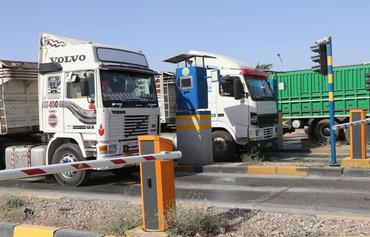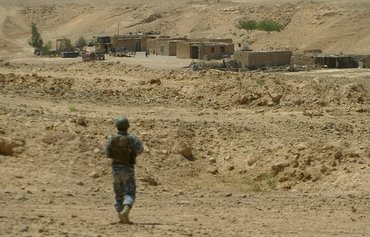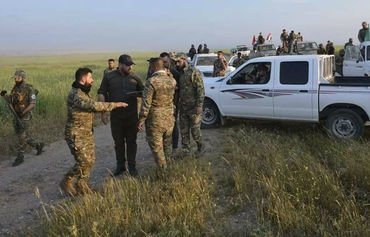Iraqi MPs and local officials have appealed to the Iraqi security forces to put an end to the violations and harassment perpetrated by Iran-backed militias operating in Ninawa province.
These militias have been engaging in activities that undermine the stability of cities liberated from the "Islamic State of Iraq and Syria" (ISIS), they said, and discourage internally displaced persons from returning to their homes.
Iraqi MP Ahmed al-Jubouri, who represents Ninawa, has appealed to Defence Minister Juma Anad and Interior Minister Othman al-Ghanmi to intervene and "stop the extortion schemes prevalent at checkpoints".
The task of manning the checkpoints must be carried out by the Ministry of Interior's Department of Checkpoint Affairs alone, he said in a May 31st post on Twitter, requesting that security cameras be installed at the sites.
Within a two-week period, residents and truck drivers in Ninawa Plains filed 13 complaints about harassment they had experienced at checkpoints, an official in the Ninawa province administrative office said.
The complainants described incidents of harassment or extortion they said had taken place at irregular checkpoints set up by Hashd al-Shabak, Babylon Movement, Kataib Hizbullah and Asaib Ahl al-Haq militias, the official said.
Truck drivers transporting goods such as food and construction materials from Baghdad or the Kurdish region to Mosul and other parts of Ninawa province complained they had faced demands for money as they passed through.
Time for militias to go
Other civilians complained that the militias had conducted illegal searches of their belongings and delayed families for up to two hours at the checkpoints without justification, the local official said.
While Iraqi forces track down ISIS cells and hideouts in Hatra desert, al-Baaj and near the border with Syria, "those militiamen are engaging in practices that are not different from the crimes committed by ISIS", he said.
Iraqi forces have been reconfiguring their deployment in the area, and have set up dedicated telephone hotlines to allow people to report incidents of harassment or extortion, the official said.
Last year, the US imposed sanctions on militia leaders on charges related to human rights abuses in Ninawa and other areas in northern and western Iraq.
The departure of militias from Iraqi cities "has become necessary and is now a major demand by the residents of liberated cities", said Iraqi MP Hamid al-Mutlaq, who serves on the parliamentary security and defence committee.
In Anbar, there have been similar complaints, he told Diyaruna, with farmers in the country's westernmost province complaining about harassment from militias.
Iraq is heading towards early elections, "which require full independence and a safe atmosphere free of pressure on voters", he said. "There is hope that the new government will seriously address the issue."
Displaced hesitant to return
According to Nabil Haji Allou, a resident of the Ninawa province district of Tal Keyf, the militias are the main reason why many of those who were displaced from the city remain hesitant to return.
"Residents feel secure in the presence of the police and the army, but there are militias who are profiting from the ISIS period," he told Diyaruna.
They seek to portray themselves as defenders of the people "while committing violations" such as setting up temporary checkpoints, he said, which they use to harass local residents and extort money from truck drivers.
An increasing number of complaints are reaching the ears of lawmakers who are demanding action, said Iraqi political affairs researcher Ahmad al-Hamdani.
This makes it clear that Iran-backed militias in Ninawa and elsewhere in the country "have become a source of threat and concern", he told Diyaruna.
Prime Minister Mustafa Kadhemi must take on this issue, he said, "because residents do not welcome militias who owe their loyalty to [former Iranian general Qassem Soleimani], and now after his death raise portraits of Qaani".
Brig. Gen. Esmail Qaani took over as commander of Iran's Islamic Revolutionary Guard Corps (IRGC) following Soleimani's death in January.

![Iraqi men take part in a rare rally in Mosul on June 8th, 2018, to mark Quds Day, a commemoration first initiated by Iran in 1979. Many participants are members of Iran-backed paramilitary units, from areas outside Mosul. [Zaid al-Obeidi/AFP]](/cnmi_di/images/2020/06/17/24585-Iraq-rally-Mosul-600_384.jpg)






